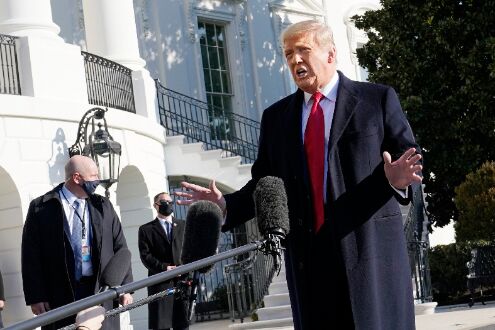The closing act?

Donald J Trump has become the only US President now to be impeached twice. The formal charge at play here is 'incitement of insurrection'. The Democrat-controlled House formally charged the President this week with the support of a handful of Republican House members who broke party lines to vote to impeach the President.
What will now follow is a Senate trial that is slated for after Donald Trump leaves office. The purpose of this trial will, obviously, no longer be to remove Donald Trump from office. Rather, once impeached, he will lose all the benefits of being a former President alongside being open to a second vote that will decide if he will be disbarred from ever holding public office again.
Although a growing number of Republicans are now in favour of removing the President or making him resign, many remain reticent to take a direct line against the President. Many of the House Republicans are pushing the rhetoric of letting bygones be bygones and proceed towards a peaceful transition of power to avoid 'further dividing the nation'. It must be stated, however, that the senior-most Republicans such as Mitch McConnell and Liz Cheney have also come out in support of removing the President from the office and the Republican Party. There are expectations that these seniormost members could function as cover for other members of the Republican Party who are also looking to break away from the President but fear antagonising his voter base. While this lends some force to the possibility of this impeachment not being dead on arrival in the Senate like the last time, some issues remain.
Legal experts and commentators have pointed towards the fact that incitement of insurrection is, in fact, not an easy thing to prove legally in court. While sections of Trump's now-infamous speech before the storming of the Capitol do tend to convey a forceful message to an expectant crowd, the bar for incitement of insurrection is intentionally high in the United States. Most cases of such charges are seen through the lens of the legal precedent set in the 1969 'Brandenburg v Ohio' which placed great emphasis on the context and intent of the speech. In this regard, it is difficult to say which way Trump's speech, as a whole and in parts, will be interpreted when the charges are discussed in detail. In the meanwhile, the Capitol riots have also raised other uncomfortable questions as well. For one, there has been a great outpouring of shock and anger against the failure of Capitol security in holding back the rioters from reaching the Capitol. Many compared the laxity of the security arrangements during the riot to the enhanced security measures taken last year during the time of BLM demonstrations. Indeed, statistics released this week have shown that US police response across some 13,000 protests showed that police were three times as likely to use force against left-wing protestors. Several shocking facts have been revealed regarding the security lapses at the Capitol in the meanwhile. Several videos have shown that parts of the Capitol police not only allowed the rioters to come up to the Capitol, some even posed for pictures with the rioters. There have also been unconfirmed reports that Trump held up the deployment of the National Guard until someone from his own administration forced his hand. Finally, there have also been concerns over the presence of military personnel in the crowd of rioters. The Joint Chiefs of Staff put out a statement recently that not only condemned the rioters but also warned US military personnel against breaking their oath to the constitution of America. The Defence Department has announced that it will be taking extra precautions in vetting-out possible Trump sympthaisers from the security force that will stand guard at the upcoming Biden inauguration. The FBI has already raised an alert over disturbances across America on inauguration day. Even as further details of the riots are uncovered and those responsible are brought to justice, Trump has publicly refused to take any responsibility for the storming of the Capitol and has denounced his second impeachment as "divisive". Trump not taking responsibility is unlikely to shock anyone at this point. Prior-experience informs the President that regardless of the immense public backlash, he has a reasonable chance of getting away nearly consequence-free. The difference this time is that he has lost many of his significant Republican backers. Senior members of his party have apparently expressed that they wish to see Trump and his politics be separated from the Republican Party for good. In many ways, Trump may actually afford American politics a chance to heal as a truly bipartisan effort can come together in condemning Trump and the politics he stands for.



